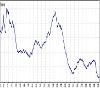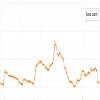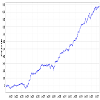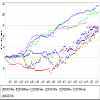- Accueil
- Communauté
- Systèmes de Trading
- KeltnerPRO - Jared
Advertisement
KeltnerPRO - Jared (de keltnerpro )
| Gain : | +5645.75% |
| Drawdown | 58.74% |
| Pips: | 4744.8 |
| Transactions | 1003 |
| Gagné: |
|
| Perdu: |
|
| Type: | Réel |
| Levier: | 1:100 |
| Trading: | Inconnu |
Edit Your Comment
Discussion KeltnerPRO - Jared
Oct 17, 2016 at 19:55
(édité Oct 17, 2016 at 19:57)
Membre depuis Jul 09, 2014
posts 47
InsiderBCN posted:
Anyone can share their experience with that system?
Two systems with history...
Im writing about my experiences, so yours can be different ;)
Nov 08, 2016 at 12:06
Membre depuis May 10, 2013
posts 52
InsiderBCN posted:
Anyone can share their experience with that system?
Hi you can search in myfxbook with key word "Keltner" and you will find several cases
(big part of them with Keltner Pro).
My personal experience is positive with around 43% in 9 months.
Keltner Pro is a key part of my forex strategy and I'm happy with it.
The DD is increasing and trading frequency is reducing (I don't like that).
Having a precise idea about when to stop the EA I don't care and in the worst
case I will temporary stop. Indeedly on October 7 very bad situation with unexpected
loss.
Cheers
Find an edge and trade it
Nov 29, 2016 at 08:09
Membre depuis May 25, 2013
posts 3
By go through history test with tds, I find the 2 critical elements to make this ea successful are:
1. its winning rate is around 48%-53%
2. its rr ratio is about 1.4-1.6
now here is my question, the winning rate will be lower if we setup maxopenposition=1(usually 5% lower than we setup maxopenposition=3), so it looks like the second and third trades average up the overall winning rate. Is that possible we can get higher winning rate if we skip the first trade and just open second and third trades?
1. its winning rate is around 48%-53%
2. its rr ratio is about 1.4-1.6
now here is my question, the winning rate will be lower if we setup maxopenposition=1(usually 5% lower than we setup maxopenposition=3), so it looks like the second and third trades average up the overall winning rate. Is that possible we can get higher winning rate if we skip the first trade and just open second and third trades?
Dec 12, 2016 at 12:23
Membre depuis Jul 09, 2014
posts 47
Im writing about my experiences, so yours can be different ;)
Feb 09, 2017 at 07:55
Membre depuis Jan 24, 2017
posts 104
keltnerpro posted:
Because I have plenty of other accounts not shown, this is my re-investment account used for proof and used to build up a nest egg
for the future.
What is the minimun deposit recomended for this EA...?... And broker,,,?...
Thanks.
Membre depuis Jan 02, 2015
posts 13
Apr 13, 2017 at 06:48
Membre depuis Jan 02, 2015
posts 13
Gebbe posted:besttools posted:
Drawdown: 58.74% is big risk...
And you Withdrawals: $0.00 !!!!!!
you use free demo bonus deposit !!!!!!!!! LOL
big return as well.
High risk strategy is thousand times better than low risk.
You have to just withdraw capital (50%) every year.
Plan Your Trade. Trade Your Plan.
Membre depuis Mar 12, 2013
posts 4
Jun 27, 2017 at 06:29
Membre depuis Aug 25, 2012
posts 32
Issues of volatility can be ironed out by implementing 3 simple things:
1) Only allowing 1 trade per pair at a time
2) Keeping to fixed lots and only increase lots (manually) at new equity highs
3) Adding more currency pairs and at different time frames
To continue making this EA work smoothly (as is the case for me) - I've added/modified the following pairs/timeframes (they've all been backtested):
AUDUSD M5,
EURGBP H1,
EURUSD M15, EURUSD M30,
GBPUSD M5, GBPUSD M15,
NZDUSD M15,
USDCHF M5, USDCHF M15
USDJPY M15
Lot sizing will need to be re-adjusted as well as there are duplicate pairs (i.e. EURUSD, GBPUSD, and USDCHF) plus they all perform at different frequencies and profitabilities, historically speaking (this is optional).
For a $10k start balance, lot sizes could be:
AUDUSD = 0.12
EURGBP = 0.12
EURUSD = 0.02 (0.02*2=0.04)
GBPUSD = 0.02 (0.02*2=0.04)
NZDUSD = 0.12
USDCHF = 0.02 (0.02*2=0.04)
USDJPY = 0.12
Of course, one could just stick to the standard fixed 0.01 lot per $1k rule to keep things simple.
*Note: there's probably a few more timeframes / currency pairs that could work to create a great combo (i.e. H1 timeframe, SGD currency pair). You'll need to perform your own backtests to check if they are satisfactory to your preferences.
Here's a portfolio backtest (max drawdown hovers around ~10%):
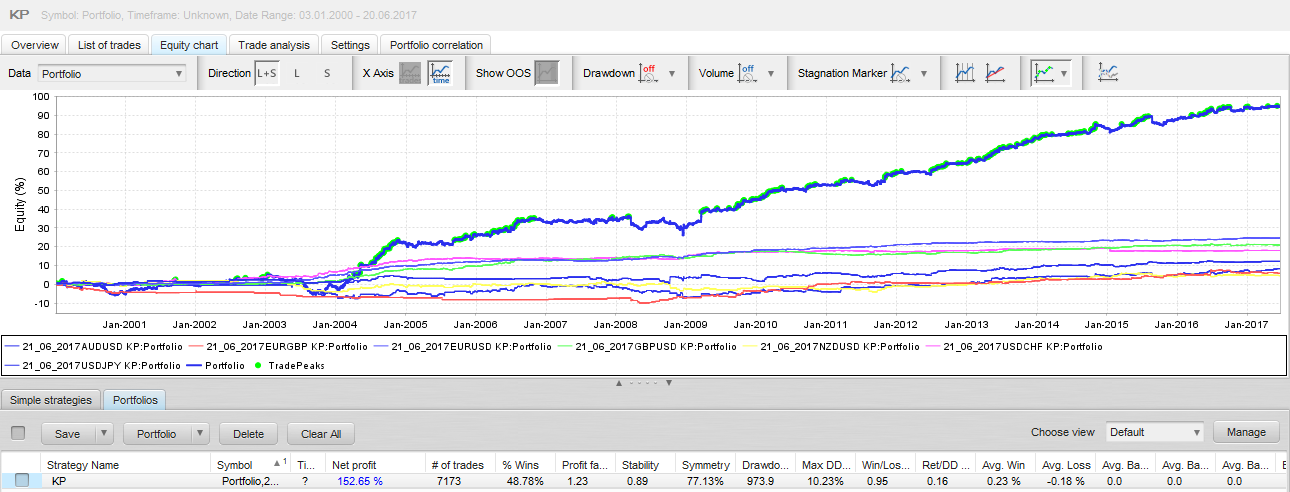


1) Only allowing 1 trade per pair at a time
2) Keeping to fixed lots and only increase lots (manually) at new equity highs
3) Adding more currency pairs and at different time frames
To continue making this EA work smoothly (as is the case for me) - I've added/modified the following pairs/timeframes (they've all been backtested):
AUDUSD M5,
EURGBP H1,
EURUSD M15, EURUSD M30,
GBPUSD M5, GBPUSD M15,
NZDUSD M15,
USDCHF M5, USDCHF M15
USDJPY M15
Lot sizing will need to be re-adjusted as well as there are duplicate pairs (i.e. EURUSD, GBPUSD, and USDCHF) plus they all perform at different frequencies and profitabilities, historically speaking (this is optional).
For a $10k start balance, lot sizes could be:
AUDUSD = 0.12
EURGBP = 0.12
EURUSD = 0.02 (0.02*2=0.04)
GBPUSD = 0.02 (0.02*2=0.04)
NZDUSD = 0.12
USDCHF = 0.02 (0.02*2=0.04)
USDJPY = 0.12
Of course, one could just stick to the standard fixed 0.01 lot per $1k rule to keep things simple.
*Note: there's probably a few more timeframes / currency pairs that could work to create a great combo (i.e. H1 timeframe, SGD currency pair). You'll need to perform your own backtests to check if they are satisfactory to your preferences.
Here's a portfolio backtest (max drawdown hovers around ~10%):



- TimeWarp to 2030 AD -
Membre depuis Dec 04, 2010
posts 1447
Jul 06, 2017 at 09:46
Membre depuis Dec 04, 2010
posts 1447
vocasla posted:
Issues of volatility can be ironed out by implementing 3 simple things:
1) Only allowing 1 trade per pair at a time
2) Keeping to fixed lots and only increase lots (manually) at new equity highs
3) Adding more currency pairs and at different time frames
To continue making this EA work smoothly (as is the case for me) - I've added/modified the following pairs/timeframes (they've all been backtested):
AUDUSD M5,
EURGBP H1,
EURUSD M15, EURUSD M30,
GBPUSD M5, GBPUSD M15,
NZDUSD M15,
USDCHF M5, USDCHF M15
USDJPY M15
Lot sizing will need to be re-adjusted as well as there are duplicate pairs (i.e. EURUSD, GBPUSD, and USDCHF) plus they all perform at different frequencies and profitabilities, historically speaking (this is optional).
For a $10k start balance, lot sizes could be:
AUDUSD = 0.12
EURGBP = 0.12
EURUSD = 0.02 (0.02*2=0.04)
GBPUSD = 0.02 (0.02*2=0.04)
NZDUSD = 0.12
USDCHF = 0.02 (0.02*2=0.04)
USDJPY = 0.12
Of course, one could just stick to the standard fixed 0.01 lot per $1k rule to keep things simple.
*Note: there's probably a few more timeframes / currency pairs that could work to create a great combo (i.e. H1 timeframe, SGD currency pair). You'll need to perform your own backtests to check if they are satisfactory to your preferences.
Here's a portfolio backtest (max drawdown hovers around ~10%):
https://www.myfxbook.com/files/vocasla/KP_2017__portfolio.png
Am I reading these results right, 152% return over a 16 year period with 10% max drawdown. This seems like a very low return for such a long backtest?
Membre depuis May 20, 2011
posts 694
Jul 06, 2017 at 19:21
Membre depuis May 20, 2011
posts 694
aeronthomas posted:i dunno seems pretty good to me. Not many investments can achieve such great of a return with such low risk,vocasla posted:
Issues of volatility can be ironed out by implementing 3 simple things:
1) Only allowing 1 trade per pair at a time
2) Keeping to fixed lots and only increase lots (manually) at new equity highs
3) Adding more currency pairs and at different time frames
To continue making this EA work smoothly (as is the case for me) - I've added/modified the following pairs/timeframes (they've all been backtested):
AUDUSD M5,
EURGBP H1,
EURUSD M15, EURUSD M30,
GBPUSD M5, GBPUSD M15,
NZDUSD M15,
USDCHF M5, USDCHF M15
USDJPY M15
Lot sizing will need to be re-adjusted as well as there are duplicate pairs (i.e. EURUSD, GBPUSD, and USDCHF) plus they all perform at different frequencies and profitabilities, historically speaking (this is optional).
For a $10k start balance, lot sizes could be:
AUDUSD = 0.12
EURGBP = 0.12
EURUSD = 0.02 (0.02*2=0.04)
GBPUSD = 0.02 (0.02*2=0.04)
NZDUSD = 0.12
USDCHF = 0.02 (0.02*2=0.04)
USDJPY = 0.12
Of course, one could just stick to the standard fixed 0.01 lot per $1k rule to keep things simple.
*Note: there's probably a few more timeframes / currency pairs that could work to create a great combo (i.e. H1 timeframe, SGD currency pair). You'll need to perform your own backtests to check if they are satisfactory to your preferences.
Here's a portfolio backtest (max drawdown hovers around ~10%):
https://www.myfxbook.com/files/vocasla/KP_2017__portfolio.png
Am I reading these results right, 152% return over a 16 year period with 10% max drawdown. This seems like a very low return for such a long backtest?
Jul 07, 2017 at 05:57
Membre depuis Aug 25, 2012
posts 32
aeronthomas posted:
Am I reading these results right, 152% return over a 16 year period with 10% max drawdown. This seems like a very low return for such a long backtest?
Leverage was set to fixed lot in order to show the underlying performance and minimize visual bias i.e. observe that the Stability factor = 0.89. With auto-lot function, the net gain in percent would be higher than that, with greater drawdown. I didn't show here the compound annual growth rate (CAGR).
Also note, I didn't do any analysis of winrate changes over time, either. So the statistical analysis above is fairly limited.
I merely wanted to show stability over time up to the present.
- TimeWarp to 2030 AD -
Membre depuis Dec 04, 2010
posts 1447
Jul 12, 2017 at 11:09
Membre depuis Dec 04, 2010
posts 1447
vocasla posted:Okay that explains it. Yes with compounding and increasing lot sizes it would be very interesting to see results.aeronthomas posted:
Am I reading these results right, 152% return over a 16 year period with 10% max drawdown. This seems like a very low return for such a long backtest?
Leverage was set to fixed lot in order to show the underlying performance and minimize visual bias i.e. observe that the Stability factor = 0.89. With auto-lot function, the net gain in percent would be higher than that, with greater drawdown. I didn't show here the compound annual growth rate (CAGR).
Also note, I didn't do any analysis of winrate changes over time, either. So the statistical analysis above is fairly limited.
I merely wanted to show stability over time up to the present.
Jul 18, 2017 at 06:57
Membre depuis Aug 25, 2012
posts 32
Here's a more comprehensive list of pairs:
AUDCHF M30,
AUDNZD M5,
AUDUSD M5,
EURGBP H1,
EURUSD M15, EURUSD M30,
GBPUSD M5, GBPUSD M15, GBPUSD M30, GBPUSD H1
GBPSGD M15,
NZDUSD M15,
USDCHF M5, USDCHF M15
USDJPY M15, USDJPY M30
AUDCHF M30,
AUDNZD M5,
AUDUSD M5,
EURGBP H1,
EURUSD M15, EURUSD M30,
GBPUSD M5, GBPUSD M15, GBPUSD M30, GBPUSD H1
GBPSGD M15,
NZDUSD M15,
USDCHF M5, USDCHF M15
USDJPY M15, USDJPY M30
- TimeWarp to 2030 AD -
Jul 26, 2017 at 14:36
Membre depuis Jul 09, 2014
posts 47
This is the right picture of this EA: https://www.myfxbook.com/members/forexgermany/keltnerpro/983876
Thanks to the trader who is putting all results online...
Thanks to the trader who is putting all results online...
Im writing about my experiences, so yours can be different ;)
Membre depuis Nov 16, 2012
posts 18
Membre depuis May 03, 2016
posts 13
Jul 29, 2017 at 06:14
(édité Jul 29, 2017 at 06:22)
Membre depuis May 03, 2016
posts 13
This is the statistics of the trading system
Total Pips count = 4774.8
Total Trade count = 1003
Total lots traded = 14,883.59
Ave lots per trade = 14.83 lots per trade (14,883.59/1003)
Ave pips gain per trade = 4.76 pips gain per trade (4774.8/1003 trades)
Ave pips gain per month = 132.63 (4774.8/3yrs = 1,591.6/12mths = 132.63)
Ave pips gain per day = 5.76 pips (23 trading days per month)
In another words, this system manage to gain on an average 5.76 pips per day using 14.83 lots size per trade. That sounds tremendously risky to me.
So if you can't find any other systems that can generate 5.76 pips daily and you are willing to risk 14.83 lot size per trade, then this system is well suited for you.
Don't just look at % returns to evaluate a system. I always look at the pips count 1st. No pips, mean no Profit. If a system isn't really good in generating pips count, it will always rely on risk (by increasing lot size) to boost income and thereby have impressive % returns.
There are basically 2 types of systems. Pips generating system vs Lot size boosting system.
Thus I always ask myself, is this system's winning formula based on good trading theory/concepts that enables it to keep generating pips after pips or is this system rely more on risk (lot size) to boost income.
I generally look for good pips generating system 1st and thereafter, increase my lot allocation once I found a systems that can generate good consistent pips returns. You only increase your lot size on a good stable system and not the other way, increase lot size in a risky system.
Total Pips count = 4774.8
Total Trade count = 1003
Total lots traded = 14,883.59
Ave lots per trade = 14.83 lots per trade (14,883.59/1003)
Ave pips gain per trade = 4.76 pips gain per trade (4774.8/1003 trades)
Ave pips gain per month = 132.63 (4774.8/3yrs = 1,591.6/12mths = 132.63)
Ave pips gain per day = 5.76 pips (23 trading days per month)
In another words, this system manage to gain on an average 5.76 pips per day using 14.83 lots size per trade. That sounds tremendously risky to me.
So if you can't find any other systems that can generate 5.76 pips daily and you are willing to risk 14.83 lot size per trade, then this system is well suited for you.
Don't just look at % returns to evaluate a system. I always look at the pips count 1st. No pips, mean no Profit. If a system isn't really good in generating pips count, it will always rely on risk (by increasing lot size) to boost income and thereby have impressive % returns.
There are basically 2 types of systems. Pips generating system vs Lot size boosting system.
Thus I always ask myself, is this system's winning formula based on good trading theory/concepts that enables it to keep generating pips after pips or is this system rely more on risk (lot size) to boost income.
I generally look for good pips generating system 1st and thereafter, increase my lot allocation once I found a systems that can generate good consistent pips returns. You only increase your lot size on a good stable system and not the other way, increase lot size in a risky system.
Sound Trading Theory = Good Profit
Membre depuis Apr 25, 2013
posts 102

*Lutilisation commerciale et le spam ne seront pas tolérés et peuvent entraîner la fermeture du compte.
Conseil : Poster une image/une url YouTube sera automatiquement intégrée dans votre message!
Conseil : Tapez le signe @ pour compléter automatiquement un nom dutilisateur participant à cette discussion.






